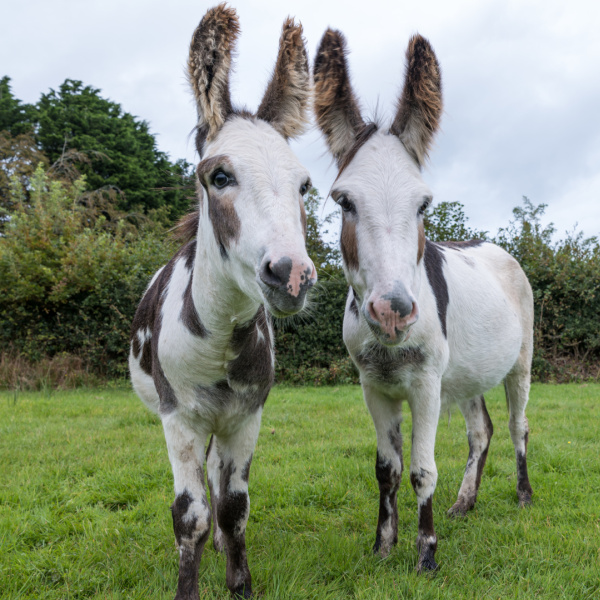A group of starving donkeys, who were rescued from a storm-ravaged and dangerous wasteland, are now thriving in the care of international animal welfare charity, The Donkey Sanctuary.
The donkeys, including a three-month old foal, were all in a poor state of health when they were found living in a waterlogged field strewn with barbed wire and broken glass
The donkeys had little food and their hooves were overgrown. Following a joint rescue from the site, near Stourport-on-Severn in Worcestershire, between The Donkey Sanctuary, World Horse Welfare and the RSPCA the donkeys are now safe and have a home for life.
The foal, named Splash, along with Marina, Storm and Dennis, had endured Storm Dennis, one of 2019's most violent winter storms, with nothing to protect them from the torrential rain and gale force winds.
Much of the area had flooded, and they were confined to a strip of boggy land in the field, surrounded by industrial metal fencing.
The foal's mother Marina, was in a particularly poor condition and very underweight. Her overgrown hooves were causing her pain, even when standing still. She was also suffering from a skin condition that caused sores to her face and legs.
The lack of food meant she was having difficulty producing the milk needed to feed her foal.
Arriving at the scene, Adele Crompton, Donkey Welfare Adviser at The Donkey Sanctuary, was shocked to discover the donkeys living in such bad conditions.
She said: "The land was completely strewn with rubbish - the donkeys were living among strips of barbed wire, broken windows and shards of glass, and building debris which posed a risk of serious injury."
Working in collaboration with the other agencies, The Donkey Sanctuary was able to take the donkeys into their care, after they were initially taken into the possession of the police. They were transported to a nearby holding base where they received urgent veterinary and farriery care.
Donkey Welfare Adviser, Adele Crompton continued: "The lack of basic care meant that the welfare needs of the donkeys were not met and they were at risk of further suffering.
"They were forced to live among filth and rubbish, and their field was completely waterlogged and so dangerous. There was barbed wire all over the floor, which they could have easily cut themselves on and got tangled up in.
"The pain Marina would have been in had she not had her feet treated does not bear thinking about. If it had not been for our intervention, they would not have been able to survive, Splash especially."
Now, seven months on, the outlook is far better for the group, as Splash and Marina, along with Dennis, two, and one-year-old colt Storm are thriving in the care of The Donkey Sanctuary.
After spending time being handled by expert farriers and grooms the donkeys are beginning to grow in confidence and their personalities are starting to shine through.
The four donkeys will now be given a safe and loving home for life, either at The Donkey Sanctuary, or in one of its Guardian Homes through charity's Rehoming scheme.
The Donkey Sanctuary is a global leader for equine welfare, research and veterinary care. The charity operates programmes worldwide for animals working in agriculture, industry and transportation.
For interviews, images and information please contact The Donkey Sanctuary press office on 01395 573124 or 07870 849563 (including out of hours) or send an email.
The Donkey Sanctuary is the world's largest equine welfare charity. Our vision is a world where donkeys and mules live free from suffering and their contribution to humanity is fully valued. We run 10 sanctuaries around the UK and Europe, giving lifelong care to more than 7,000 donkeys and mules. Our hospital treats sick donkeys and trains vets both nationwide and worldwide. Our donkey-facilitated learning programme helps vulnerable children and adults develop life skills by connecting with donkeys on an emotional and physical level. The charity operates programmes worldwide for animals working in agriculture, industry and transportation, and those used in the production of meat and skin.
